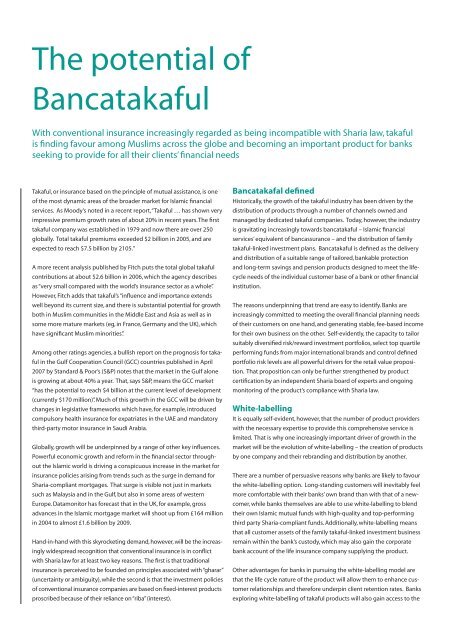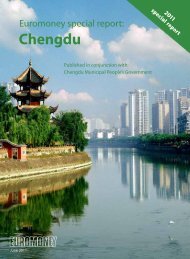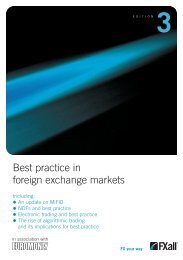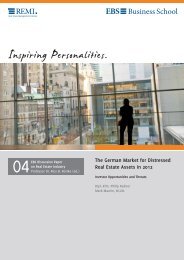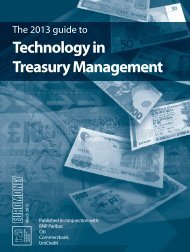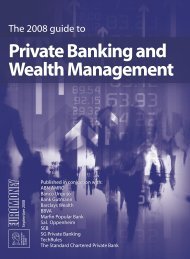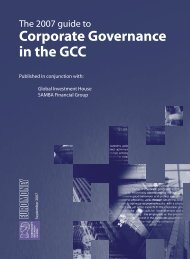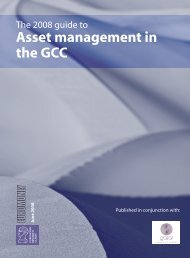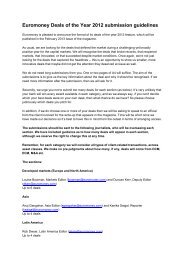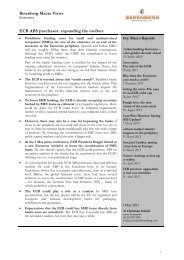Opportunities & Trends in Islamic Finance - Euromoney
Opportunities & Trends in Islamic Finance - Euromoney
Opportunities & Trends in Islamic Finance - Euromoney
- No tags were found...
Create successful ePaper yourself
Turn your PDF publications into a flip-book with our unique Google optimized e-Paper software.
The potential ofBancatakafulWith conventional <strong>in</strong>surance <strong>in</strong>creas<strong>in</strong>gly regarded as be<strong>in</strong>g <strong>in</strong>compatible with Sharia law, takafulis f<strong>in</strong>d<strong>in</strong>g favour among Muslims across the globe and becom<strong>in</strong>g an important product for banksseek<strong>in</strong>g to provide for all their clients’ f<strong>in</strong>ancial needsTakaful, or <strong>in</strong>surance based on the pr<strong>in</strong>ciple of mutual assistance, is oneof the most dynamic areas of the broader market for <strong>Islamic</strong> f<strong>in</strong>ancialservices. As Moody’s noted <strong>in</strong> a recent report, “Takaful … has shown veryimpressive premium growth rates of about 20% <strong>in</strong> recent years. The firsttakaful company was established <strong>in</strong> 1979 and now there are over 250globally. Total takaful premiums exceeded $2 billion <strong>in</strong> 2005, and areexpected to reach $7.5 billion by 2105.”A more recent analysis published by Fitch puts the total global takafulcontributions at about $2.6 billion <strong>in</strong> 2006, which the agency describesas “very small compared with the world’s <strong>in</strong>surance sector as a whole”.However, Fitch adds that takaful’s “<strong>in</strong>fluence and importance extendswell beyond its current size, and there is substantial potential for growthboth <strong>in</strong> Muslim communities <strong>in</strong> the Middle East and Asia as well as <strong>in</strong>some more mature markets (eg, <strong>in</strong> France, Germany and the UK), whichhave significant Muslim m<strong>in</strong>orities”.Among other rat<strong>in</strong>gs agencies, a bullish report on the prognosis for takaful<strong>in</strong> the Gulf Cooperation Council (GCC) countries published <strong>in</strong> April2007 by Standard & Poor’s (S&P) notes that the market <strong>in</strong> the Gulf aloneis grow<strong>in</strong>g at about 40% a year. That, says S&P, means the GCC market“has the potential to reach $4 billion at the current level of development(currently $170 million)”. Much of this growth <strong>in</strong> the GCC will be driven bychanges <strong>in</strong> legislative frameworks which have, for example, <strong>in</strong>troducedcompulsory health <strong>in</strong>surance for expatriates <strong>in</strong> the UAE and mandatorythird-party motor <strong>in</strong>surance <strong>in</strong> Saudi Arabia.Globally, growth will be underp<strong>in</strong>ned by a range of other key <strong>in</strong>fluences.Powerful economic growth and reform <strong>in</strong> the f<strong>in</strong>ancial sector throughoutthe <strong>Islamic</strong> world is driv<strong>in</strong>g a conspicuous <strong>in</strong>crease <strong>in</strong> the market for<strong>in</strong>surance policies aris<strong>in</strong>g from trends such as the surge <strong>in</strong> demand forSharia-compliant mortgages. That surge is visible not just <strong>in</strong> marketssuch as Malaysia and <strong>in</strong> the Gulf, but also <strong>in</strong> some areas of westernEurope. Datamonitor has forecast that <strong>in</strong> the UK, for example, grossadvances <strong>in</strong> the <strong>Islamic</strong> mortgage market will shoot up from £164 million<strong>in</strong> 2004 to almost £1.6 billion by 2009.Hand-<strong>in</strong>-hand with this skyrocket<strong>in</strong>g demand, however, will be the <strong>in</strong>creas<strong>in</strong>glywidespread recognition that conventional <strong>in</strong>surance is <strong>in</strong> conflictwith Sharia law for at least two key reasons. The first is that traditional<strong>in</strong>surance is perceived to be founded on pr<strong>in</strong>ciples associated with “gharar”(uncerta<strong>in</strong>ty or ambiguity), while the second is that the <strong>in</strong>vestment policiesof conventional <strong>in</strong>surance companies are based on fixed-<strong>in</strong>terest productsproscribed because of their reliance on “riba” (<strong>in</strong>terest).Bancatakafal def<strong>in</strong>edHistorically, the growth of the takaful <strong>in</strong>dustry has been driven by thedistribution of products through a number of channels owned andmanaged by dedicated takaful companies. Today, however, the <strong>in</strong>dustryis gravitat<strong>in</strong>g <strong>in</strong>creas<strong>in</strong>gly towards bancatakaful – <strong>Islamic</strong> f<strong>in</strong>ancialservices’ equivalent of bancassurance – and the distribution of familytakaful-l<strong>in</strong>ked <strong>in</strong>vestment plans. Bancatakaful is def<strong>in</strong>ed as the deliveryand distribution of a suitable range of tailored, bankable protectionand long-term sav<strong>in</strong>gs and pension products designed to meet the lifecycleneeds of the <strong>in</strong>dividual customer base of a bank or other f<strong>in</strong>ancial<strong>in</strong>stitution.The reasons underp<strong>in</strong>n<strong>in</strong>g that trend are easy to identify. Banks are<strong>in</strong>creas<strong>in</strong>gly committed to meet<strong>in</strong>g the overall f<strong>in</strong>ancial plann<strong>in</strong>g needsof their customers on one hand, and generat<strong>in</strong>g stable, fee-based <strong>in</strong>comefor their own bus<strong>in</strong>ess on the other. Self-evidently, the capacity to tailorsuitably diversified risk/reward <strong>in</strong>vestment portfolios, select top quartileperform<strong>in</strong>g funds from major <strong>in</strong>ternational brands and control def<strong>in</strong>edportfolio risk levels are all powerful drivers for the retail value proposition.That proposition can only be further strengthened by productcertification by an <strong>in</strong>dependent Sharia board of experts and ongo<strong>in</strong>gmonitor<strong>in</strong>g of the product’s compliance with Sharia law.White-labell<strong>in</strong>gIt is equally self-evident, however, that the number of product providerswith the necessary expertise to provide this comprehensive service islimited. That is why one <strong>in</strong>creas<strong>in</strong>gly important driver of growth <strong>in</strong> themarket will be the evolution of white-labell<strong>in</strong>g – the creation of productsby one company and their rebrand<strong>in</strong>g and distribution by another.There are a number of persuasive reasons why banks are likely to favourthe white-labell<strong>in</strong>g option. Long-stand<strong>in</strong>g customers will <strong>in</strong>evitably feelmore comfortable with their banks’ own brand than with that of a newcomer,while banks themselves are able to use white-labell<strong>in</strong>g to blendtheir own <strong>Islamic</strong> mutual funds with high-quality and top-perform<strong>in</strong>gthird party Sharia-compliant funds. Additionally, white-labell<strong>in</strong>g meansthat all customer assets of the family takaful-l<strong>in</strong>ked <strong>in</strong>vestment bus<strong>in</strong>essrema<strong>in</strong> with<strong>in</strong> the bank’s custody, which may also ga<strong>in</strong> the corporatebank account of the life <strong>in</strong>surance company supply<strong>in</strong>g the product.Other advantages for banks <strong>in</strong> pursu<strong>in</strong>g the white-labell<strong>in</strong>g model arethat the life cycle nature of the product will allow them to enhance customerrelationships and therefore underp<strong>in</strong> client retention rates. Banksexplor<strong>in</strong>g white-labell<strong>in</strong>g of takaful products will also ga<strong>in</strong> access to the


